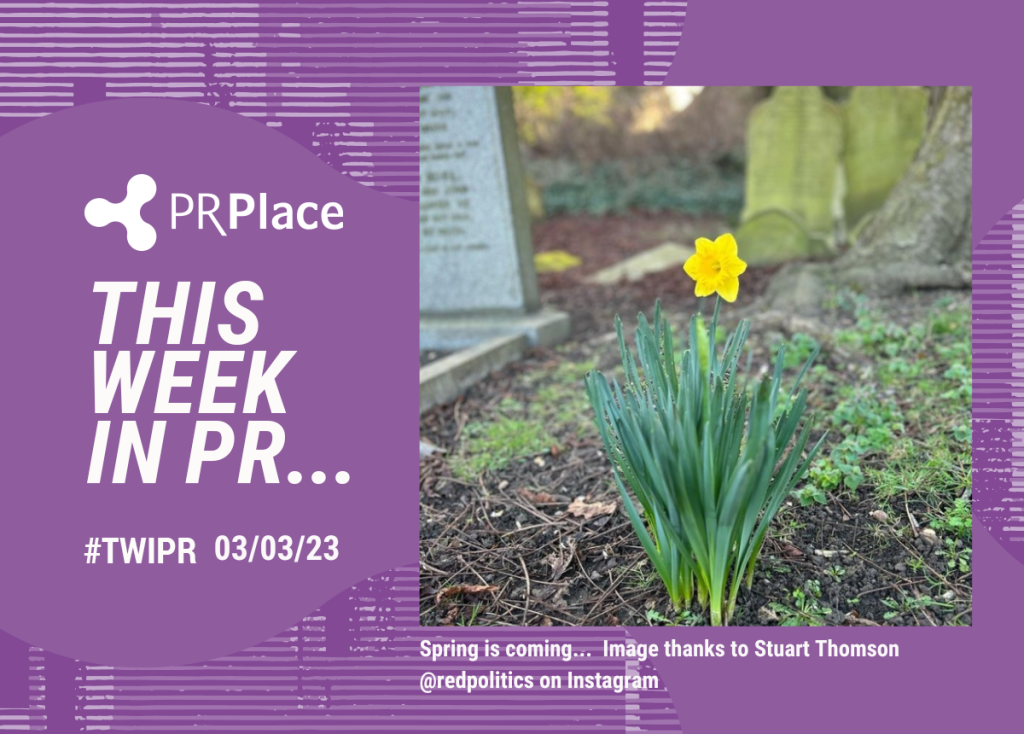This week in PR (3 March)

About the author
Richard Bailey Hon FCIPR is editor of PR Academy's PR Place Insights. He teaches and assesses undergraduate, postgraduate and professional students.

It happened this week
- Quotation of the week: ‘Every day is April Fools from now on, let’s not get fooled.’ From a Seth Godin blog post warning us of the dangers of digital manipulation and disinformation.
Profession
- Public Relations Oxford: The story of Public Relations Oxford (28 February)
‘Emma Duke and Dan Selinger set up Public Relations Oxford in 2016 because they were fed up of having to trek into London to do any networking (get out your tiny violins).’
Purpose, climate and ESG
- Stuart Lambert: ESG: an ethos, not a badge (27 February)
‘The fine lines between good intentions and greenwashing are finer than ever and regulators are dialling up the ‘overclaim’ scrutiny to unprecedented levels.’ - Katie Ormrod: FTSE 350 hits 40% women on Boards – but the work shouldn’t stop there. (2 March)
‘The FTSE Women Leaders review, a government backed initiative, set a voluntary target of 40.2% by the end of 2025 but that target has been reached three years ahead of time.’ - Dafydd Rees: Bono: The great persuader (28 February)
‘The musician turned poverty campaigner concludes by stressing the power of advocacy in achieving social transformation. “It turns out the fight for justice comes down to boring words that don’t look good on a T-shirt.” Those non-shouty words, according to Bono, amount to competence, governance, transparency and accountability.’ - Sophie Morello and Imogen Shaw: Purpose on Payday (24 February)
‘With the last COP not delivering much in terms of carbon emission cuts, the need for this year’s conference to make progress is significant.’
Consulting, skills and careers
- Nick Baron: Ten books to navigate The Networked Age (2 March)
‘Two of our long-time Networked Age research partners, Steve Martin and Joe Marks, explore the eight types of effective messenger and show that the messenger is as important as the message.’
- Emma Drake: Spring Clean Your Comms: A holistic look at your next comms plan [podcast] (2 March)
‘Today’s episode is a quick guide on reviewing your plan, cleaning your workspace, tidying your mind and looking more holistically at your planning.’
Public and third sectors
- Lucy Salvage: GUEST POST: Social media engagement, how to measure it and not care about anyone else (2 March)
‘Benchmarking social engagement against other local authorities is tricky because of the many different variables that make up each authority.’ - Darren Caveney: Comms2point0 interims – a brand new search and introduction service for candidates and recruiters (1 March)
‘I have been providing support, recommendations and introductions through my networks on an informal basis for years. The demand for this service has increased noticeably as employers have been struggling to recruit quality staff, and skilled communications professionals have been frustrated by the their experience of the interim market.’ - Rob McCleary and Helena Hornby: Big or small, we all speak the same language (28 February)
‘It doesn’t matter if there are two or 22 in the team, having a strategic plan for communications means everyone can understand what’s going on.’ - Anonymous: Spin off – don’t call us spin doctors (27 February)
‘One of the reasons I chose to work in the public sector is because being open and honest isn’t just the right ethical approach for public services, it’s also good communications practice.’
Politics, public affairs and public sphere
- Emma Goodwin: The 15-minute city: 2023’s unexpected conspiracy theory (2 March)
‘Two years on, by some strange turn of events, what was previously a much-applauded answer to bettering the urban living experience, the 15-minute city has somehow become its own conspiracy theory – allegedly a tool to curtail free movement and control the population, in some sort of modern version of 1984.’
- Phoebe-Jane Boyd: The fight against misinformation, disinformation and fake news is just beginning: Interview with Polis founder Thomas Barton (28 February)
‘As part of the Online Safety Bill, protections against the damages of untruths presented as fact will be put in place in law, but will the legislation be enough?’ - Jordan Mullan, Daisy Robertson and Gregor Smith: The Windsor Framework: A view from the UK and Brussels (28 February)
‘Spurred by positive collaboration on issues such as support for Ukraine and Russian sanctions, Rishi Sunak has managed to reset relations, impressing EU officials with outcomes rather than rhetoric.’
- Stuart Thomson: Interview with Louise Abraham, Cafod [podcast] (26 February)
‘I got into public affairs by accident. I didn’t know it was a career path when I was at school. I studied politics, but thought lobbying sounded shady and mysterious.’ - Marc Woolfson: Starmer speech – On a mission for a decade of renewal (24 February)
‘Drawing heavily from management theories used commonly in the business community, Starmer was setting out his goals – painting a picture of what success would look like by the end of his government’s first term in office.’
Research, data, measurement and evaluation
- Tressa Robbins: The Most Crucial Components of a Strategic PR Campaign (28 February)
‘Strategic thinking and analytical reasoning are indispensable for today’s communications and PR pros. It helps you understand the need for long-term planning, setting goals and priorities, and identifying potential risks and opportunities. When you can grasp the bigger picture, you become more valued as a trusted advisor to your employer or clients.’
Crisis, risk and reputation
- Amanda Coleman: Is crisis communication changing? (2 March)
‘When I first wrote the book Crisis Communication Strategies the pandemic had not happened and the most significant crises had been terror attacks and fires. The principles of crisis communication remain but the way it operates and the considerations that need to be in place is becoming increasingly complex.’
Behaviour and influence
- Megan Dennison: Is the de-influencer movement another reputational hazard? (27 February)
‘So far, the de-influencing hashtag has garnered 180 million TikTok views since the trend began in January this year. De-influencing is when content creators uncover the truth about products consumers have been pushed to purchase, all in a bid to address overconsumption.’
Internal communication
- Sarah Browning: 4 stages of change communication (2 March)
‘There are many change models available that can be useful when planning your change comms. Different models will suit different scenarios. I would also recommend being wary about confusing change communication and change management. Although closely linked, they are not the same thing.’ - Jenni Field: The dynamics of trust in the workplace (1 March)
‘In the workplace, everyone benefits when there is a feeling of trust – relationships are better, teamwork improves, teams collaborate, and productivity is higher.’ - Lucy Kemp: Why a 4-day work week isn’t the answer (27 February)
‘To truly embrace flexible working, it’s important to remember that not everyone’s needs are the same. While the four-day work week might be a great solution for some, others may need a different approach. And that’s okay. The key is to ensure that employees are given the freedom to personalise their approach to work in a way that suits them best.’
Media, digital and technology
The 30 To Watch Journalism awards are open for entries! Back for 2023, the awards celebrate the most talented and influential young journalists in Britain. Free to enter, submit your entry by 31st March. https://t.co/JL3AJiiVi1#30ToWatch #30ToWatchJournalism pic.twitter.com/pp4zg7t8jR
— MHP Group (@MHPC) March 1, 2023
- Stephen Waddington: In praise of the press release (2 March)
‘Press releases are multi purpose, multi functional documents. They are the Swiss Army Knife of public relations.’ - Neville Hobson: It looks like PR has its head in the sand about AI (1 March)
‘There’s no doubt that developments in AI are moving at quite a pace. While hype is at its peak, the time is now for learning more about AI, experimenting with it yourself, and discovering how it can be of distinct value to you in your work (and in your leisure).
#prstudent #CreatorAwards23
This section is open to any UK-based student with an interest in public relations. I don’t think this has ever happened before, and I hope it’s a one-off, but all of the student entries this week are from those I’ve been teaching this academic year. Rather than this being an example of favouritism, it’s that I’m not aware of any other students currently creating and sharing content using #prstudent. In the absence of other entries, I’ll continue to select some examples from my network to encourage others.
- Nafatiti Nimako-Boatey (Leeds Beckett): 3 cool Marketing campaigns (1 March)
‘The reason I’m dubious about this “rebrand” is the fact that for years, Burberry have tried to disassociate themselves from the same aesthetic due to the fact that working-class Brits were the main people wearing it. They were believed to be cheapening the brand.’


